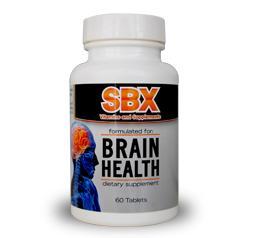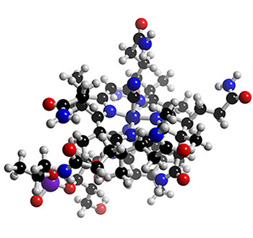B Vitamins - Treatment for Schizophrenia
Vitamin B & Schizophrenia Treatment
Why YOU Need SBX Supplements & Vitamin B
Because people with schizophrenia often have a genetic variation that can lead to a vitamin B deficiency. This means they require more B vitamins to maintain chemical balance. Vitamin B consumption may compensate for this, therefore vitamin B should be taken as part of any schizophrenia treatment to assist in recovery.
A vital process known as methylation is partially responsible for maintaining the chemical balance of the brain. If there is too high a level of homocysteine (a toxic protein that the body makes from dietary protein) in the blood then this is a sign that the methylation process is not working correctly. If a person gets enough vitamin B9 (folic acid), vitamin B12 and vitamin B6, homocysteine levels in the body reduce. Unfortunately, many people with schizophrenia, in particular young males, have higher levels of homocysteine in the blood than they ideally should. These high levels occur despite any obvious lack of vitamins in their diet. The reason for this, from a study of the relevant genetics seem to be that people with schizophrenia are more likely to have inherited a genetic variation of an important homocysteine lowering enzyme.
Because vitamin B12 and Folate (B9) supplementation reduces negative symptoms of schizophrenia in people who possess a particular gene variant.
The Roffman study: A 2012 study led by Dr. Joshua Roffman (US), tracked 140 people with schizophrenia for 16 weeks. The participants were divided into 2 groups for a placebo controlled study. The study found that those with the so-called high-functioning FOLH1 genetic variation showed a reduction in negative symptoms when receiving folic acid (2mgs) and B12 supplements (400mcgs), compared to those with the low-functioning FOLH1 genetic variation. This study, is particularly authoritative because it examined the effects of the supplements in a large population of people with schizophrenia and includes an analysis of genetics. The study was spread across several medical centres in Massachusetts, New York and Michigan in the US and used the gold standard of a randomized, double blind, placebo controlled study (Published in JAMA Psychiatry, March 6, 2013.).
Because low plasma folate (vitamin B9) and high homocysteine levels have been noted in schizophrenia patients and identified as a possible independent risk factor in schizophrenia.
The Saedisomeolia Study: A 2011 study conducted at Taliqani Hospital in Tehran, Iran compared 60 patients with schizophrenia against 60 health controls. It was hypothesized that a faulty folate metabolism could be part of the mechanism that causes schizophrenia. Participants in the study were tested for serum folate, cobalamin and red blood cell (RBC) folate by using radio isotope dilution assay. The average of folate intake in the patients (ie the folate they ingested) was similar to the healthy controls. Notwithstanding, the serum folate levels of schizophrenia patients (ie the folate in their blood) were significantly below that of the health controls. So the lower plasma folate levels in the schizophrenia patients may be explained by a faulty folate mechanism. In addition to the low levels, five out of 60 of the patients were actually deficient, while none of the controls were deficient. This study further emphasizes the need for supplementation with folate in schizophrenia patients.This study is also informative because it includes an analysis of many of the studies conducted elsewhere and links to these studies are included for anyone wanting to conduct further research.
The Netherlands Study: A 2003 Study at Mental Health Institute, Nijmegen, The Netherlands compared plasma and red blood cell folate, vitamin B6, vitamin B12 and total homocysteine concentrations of 35 schizophrenia patients with those of 104 unrelated controls. The study found that patients with schizophrenia had significantly lower plasma folate levels when adjusted for homocysteine levels. Plasma folate levels below the 10th percentile were associated with a 4 to 7 fold increase in the risk of schizophrenia.
What Are Vitamin B3, B6, B9 & B12?
- Vitamin B3: is also known as niacin (nicotinic acid). B3 can be found in poultry, red meat, fish, nuts, potatoes, pasta, yeast extract, breakfast cereals and bread.
- Vitamin B6: has an active form called pyridoxal phosphate. B6 is found in fortified cereals, beans, meat, poultry, fish and some fruits and vegetables.
- Vitamin B9: is also known as folic acid. Folic acid is also known as Bc or folacin and folate and is found in green leafy food, beans, peas, lentils, egg yolk, baker’s yeast, breakfast cereals, sunflower seeds, liver, kidney, certain fruits and beer. Folate is known to be used by the body in the manufacturing of neurotransmitters which send signals throughout the brain and body.
- Vitamin B12: is also known as cobalamin. It has a key role in the normal functioning of the brain and nervous system. B12 can be found in beef, liver, clams, fish, poultry, meat, eggs, milk and other dairy products and some fortified cereals.
These ‘B’ vitamins help to convert carbohydrates into glucose which is used to provide energy. They also help the body metabolise fats and proteins. They’re water-soluable, and so, the body doesn’t store them.
Buy Supplements

SBX Supplements for Schizophrenia
SBX is a supplement for those suffering from schizophrenia. The formulation contains the different vitamins and natural ingredients that studies suggest may reduce the symptoms of schizophrenia and help with recovery from schizophrenia.
$29 per bottle (Total of 60 capsules)
Ingredients
Client’s testimonials

I started taking SBX with my prescribed antipsychotics and felt more alert and my mood became more positive. I had been out of work for some time and beginning to worry about money as I have limited health insurance, but now, I have just started a new, part-time job, in the food sector, and have even, much to my friends' surprise, started dating again! Thank you SBX! I won't go a day without this supplement.

My doc mentioned taking more supplements like ginkgo biloba, B vitamins etc with my meds. Buying a bunch of different vitamins is expensive so I tried SBX. Before I started SBX, my doc told me I was paranoid (which I still am btw) but the voices were really taking over me. The voices are still there, but I've noticed they've started to quieten a little...

